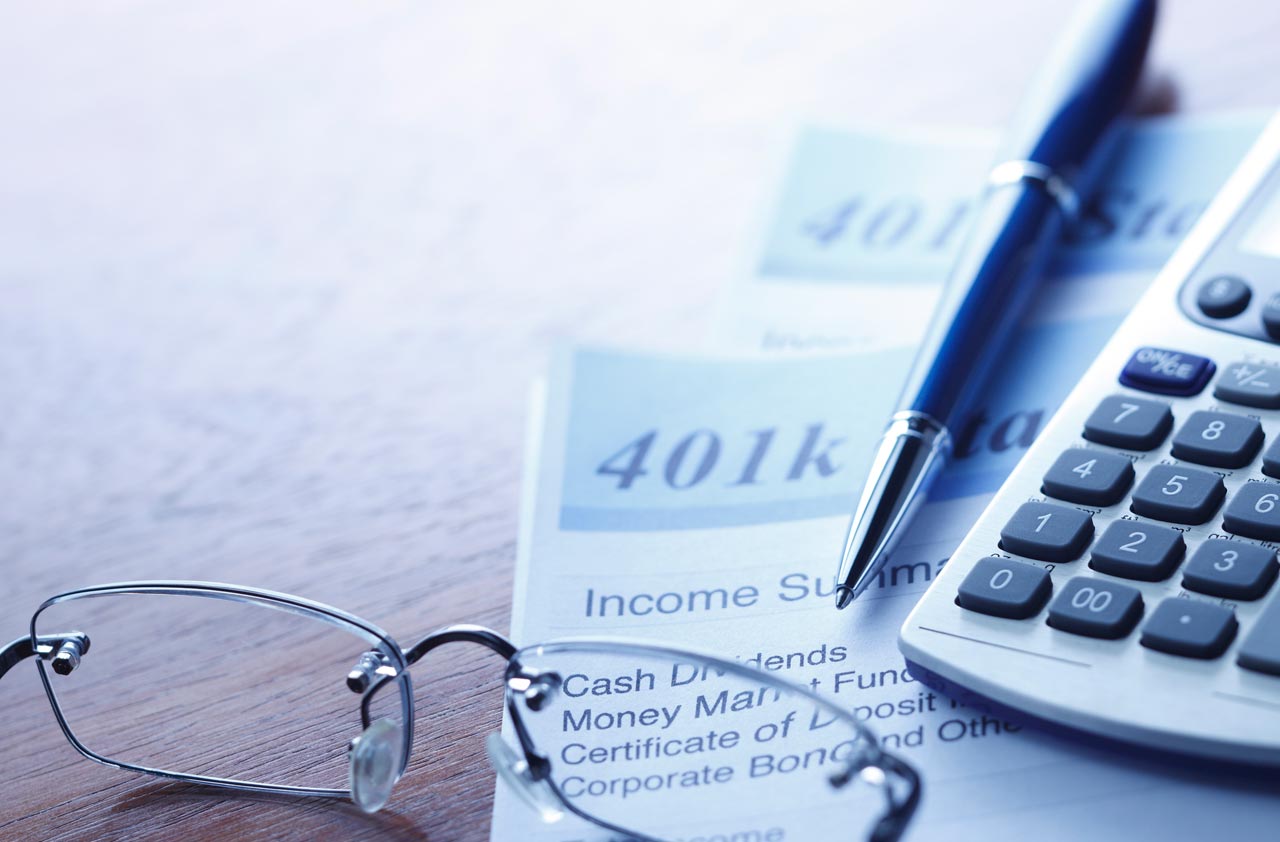What Is a 401(k) Retirement Savings Plan?
A 401(k) is a retirement plan sponsored by an employer that offers employees tax incentives to save money for retirement from their paychecks.

Rivan V. Stinson

Profit and prosper with the best of Kiplinger's advice on investing, taxes, retirement, personal finance and much more. Delivered daily. Enter your email in the box and click Sign Me Up.
You are now subscribed
Your newsletter sign-up was successful
Want to add more newsletters?

Delivered daily
Kiplinger Today
Profit and prosper with the best of Kiplinger's advice on investing, taxes, retirement, personal finance and much more delivered daily. Smart money moves start here.

Sent five days a week
Kiplinger A Step Ahead
Get practical help to make better financial decisions in your everyday life, from spending to savings on top deals.

Delivered daily
Kiplinger Closing Bell
Get today's biggest financial and investing headlines delivered to your inbox every day the U.S. stock market is open.

Sent twice a week
Kiplinger Adviser Intel
Financial pros across the country share best practices and fresh tactics to preserve and grow your wealth.

Delivered weekly
Kiplinger Tax Tips
Trim your federal and state tax bills with practical tax-planning and tax-cutting strategies.

Sent twice a week
Kiplinger Retirement Tips
Your twice-a-week guide to planning and enjoying a financially secure and richly rewarding retirement

Sent bimonthly.
Kiplinger Adviser Angle
Insights for advisers, wealth managers and other financial professionals.

Sent twice a week
Kiplinger Investing Weekly
Your twice-a-week roundup of promising stocks, funds, companies and industries you should consider, ones you should avoid, and why.

Sent weekly for six weeks
Kiplinger Invest for Retirement
Your step-by-step six-part series on how to invest for retirement, from devising a successful strategy to exactly which investments to choose.
What is a 401(k)? This tax-friendly retirement plan allows you to save and invest for retirement through payroll deductions. Your employer might even match your savings.
What is a 401(k)?
If you go to work for a large private employer, chances are you will be offered a 401(k) account. Since its inception 40 years ago, the 401(k) has become the retirement plan of choice for many employers, which have moved away from providing traditional pension plans. In the last quarter of 2023, assets in 401(k)s totaled almost $7 trillion, according to the Investment Company Institute.
Note that if you work for a non-profit organization, church or school, you may be offered a 403(b) retirement plan instead.
From just $107.88 $24.99 for Kiplinger Personal Finance
Become a smarter, better informed investor. Subscribe from just $107.88 $24.99, plus get up to 4 Special Issues

Sign up for Kiplinger’s Free Newsletters
Profit and prosper with the best of expert advice on investing, taxes, retirement, personal finance and more - straight to your e-mail.
Profit and prosper with the best of expert advice - straight to your e-mail.
How does a 401(k) plan work?
Contributions to a traditional 401(k) are deducted from your paychecks before the money is taxed. You determine the pretax amount you invest each pay period, although the maximum 401(k) contribution you can make in 2024 is $23,000 if you’re younger than 50. If you’re age 50 or older, you can get an added savings boost by making up to a $7,500 catch-up contribution, which brings the annual maximum 401(k) contribution to $30,500.
The money you save in a 401(k) account grows tax-deferred until you withdraw it in retirement. At that point, you will owe ordinary income tax on the withdrawals. If you take out money before age 59½, you generally will be hit with a 10% early-withdrawal penalty on top of taxes.
Employers typically provide a mix of mutual funds for you to invest in, including low-cost index funds that track the broad stock market and bond market. Other 401(k) investment options might include company stock, exchange-traded funds (ETFs) and variable annuities.
The most popular investment options in 401(k)s are target-date funds. With target-date funds, you choose a fund whose name contains the date closest to your expected year of retirement. The fund manager will invest aggressively when you’re younger, and the fund will gradually become more conservative as you near retirement age.
Auto-enrollment in 401(k)s
Even if you don’t actively enroll in a 401(k), your employer might automatically do it for you. That's because most people don't save enough for retirement on their own, and the extra nudge will (hopefully) set them up for a more secure retirement. This approach to retirement savings is so popular among lawmakers that they passed legislation in 2022 called the SECURE 2.0 Act, which will require or incentivize most companies to automatically enroll their employees. The law goes into effect in 2025.
With auto-enrollment, employers deduct, say, 3% or 4% from your pay and invest it in a 401(k) — often in a target-date fund based on your age. You can always opt out or change your contribution rate or investment selection.
Auto-escalation in 401(k)s
Starting in 2025, the Secure Act 2.0 will also require employers to adopt auto-escalation, automatically increasing your annual contributions. Your paycheck will reflect contributions to your 401(k) account starting at a minimum rate of 3%, but no more than 10%. This rate will increase by 1% per year and max out at 15%. You still have the option to opt out of the plan completely or change your contribution rate.
Extra benefits of a 401(k)
In addition to building a nest egg for retirement, stashing money in a 401(k) lowers your current tax bill. That’s because your pretax contributions reduce the amount of current wages subject to tax. For example, if your monthly income is $4,500 and you contribute $1,000 of that to your 401(k), only $3,500 of your paycheck will be subject to tax.
Roth 401(k): Some employers offer employees the option to open a Roth 401(k) account instead of a traditional 401(k). As with a Roth IRA, contributions to a Roth 401(k) are made with after-tax dollars. The big benefit to workers is that withdrawals made in retirement aren’t subject to tax. Contribution limits to a Roth 401(k) are the same as a traditional 401(k).
Employer match: Did someone say "free money?" Many employers encourage participation in a 401(k) plan by matching workers’ contributions by, say, 50 cents for every dollar an employee contributes — up to 6% of pay. Some employers even contribute to workers’ 401(k)s regardless of whether employees put in their own money.
Make sure you contribute enough to receive your full employer match. Otherwise, you are leaving free money on the table. And if you’re not already maxing out your contributions, don’t forget to ramp up your savings with each pay raise until you reach the max.
Employer-matched contributions are not counted toward the total you can contribute to your 401(k).
Employers may decide to match at less than a one-to-one rate. For example, if you set aside 3% annually, they may "match" only 1%. Or they may increase the match rate the longer you stay with the company.
Vesting
All of the money that you contribute to your 401(k) is yours to keep. However, if your employer says that they have "vesting" rules, that means that you may not keep the amount your employer deposits (or matches) in your account if you leave the company before a certain amount of time has passed. It's one way that employers may try to reduce turnover.
In many cases, the vesting period is three years. In some companies, you may be vested immediately, and in others, you may have to wait up to six years. If you leave earlier than then, you get to keep all of the money that you contributed from your paycheck, but not the employer match.
You may also become fully vested if you reach full retirement age or your company closes its retirement account.
Stay on top of 401(k) fees
Not all 401(k)s are created equal, and high fees can quickly eat away at an account balance. Pay close attention to the expense ratios of your investments and the administration fees charged by your plan. Check your statements or log in to your 401(k) account to research expenses ratios and fees.
Fees have slowly come down over the past few years but remain higher than many people realize. In 2022, the average fee for large (over $50 million in assets) 401(k) plans was 0.85%. The average fee for smaller plans was 1.09%, and some small plan providers charged over 2.5%, according to the American Society of Pension Professionals & Actuaries. Most people would never agree to pay that high a fee to an investment adviser, so why line the pockets of your 401(k) plan sponsor from your retirement funds?
If you are unsure how to calculate the fees in your 401(k) account, contact your plan sponsor or your company's benefits department for help.
Read More
Profit and prosper with the best of Kiplinger's advice on investing, taxes, retirement, personal finance and much more. Delivered daily. Enter your email in the box and click Sign Me Up.

Ellen writes and edits retirement stories. She joined Kiplinger in 2021 as an investment and personal finance writer, focusing on retirement, credit cards and related topics. She worked in the mutual fund industry for 15 years as a manager and sustainability analyst at Calvert Investments. She earned a master’s from U.C. Berkeley in international relations and Latin America and a B.A. from Haverford College.
- Rivan V. StinsonEx-staff writer, Kiplinger's Personal Finance
-
 Quiz: Do You Know How to Avoid the "Medigap Trap?"
Quiz: Do You Know How to Avoid the "Medigap Trap?"Quiz Test your basic knowledge of the "Medigap Trap" in our quick quiz.
-
 5 Top Tax-Efficient Mutual Funds for Smarter Investing
5 Top Tax-Efficient Mutual Funds for Smarter InvestingMutual funds are many things, but "tax-friendly" usually isn't one of them. These are the exceptions.
-
 AI Sparks Existential Crisis for Software Stocks
AI Sparks Existential Crisis for Software StocksThe Kiplinger Letter Fears that SaaS subscription software could be rendered obsolete by artificial intelligence make investors jittery.
-
 What Does Medicare Not Cover? Eight Things You Should Know
What Does Medicare Not Cover? Eight Things You Should KnowMedicare Part A and Part B leave gaps in your healthcare coverage. But Medicare Advantage has problems, too.
-
 457 Plan Contribution Limits for 2026
457 Plan Contribution Limits for 2026Retirement plans There are higher 457 plan contribution limits in 2026. That's good news for state and local government employees.
-
 Medicare Basics: 12 Things You Need to Know
Medicare Basics: 12 Things You Need to KnowMedicare There's Medicare Part A, Part B, Part D, Medigap plans, Medicare Advantage plans and so on. We sort out the confusion about signing up for Medicare — and much more.
-
 The Seven Worst Assets to Leave Your Kids or Grandkids
The Seven Worst Assets to Leave Your Kids or Grandkidsinheritance Leaving these assets to your loved ones may be more trouble than it’s worth. Here's how to avoid adding to their grief after you're gone.
-
 SEP IRA Contribution Limits for 2026
SEP IRA Contribution Limits for 2026SEP IRA A good option for small business owners, SEP IRAs allow individual annual contributions of as much as $70,000 in 2025, and up to $72,000 in 2026.
-
 Roth IRA Contribution Limits for 2026
Roth IRA Contribution Limits for 2026Roth IRAs Roth IRAs allow you to save for retirement with after-tax dollars while you're working, and then withdraw those contributions and earnings tax-free when you retire. Here's a look at 2026 limits and income-based phaseouts.
-
 SIMPLE IRA Contribution Limits for 2026
SIMPLE IRA Contribution Limits for 2026simple IRA For 2026, the SIMPLE IRA contribution limit rises to $17,000, with a $4,000 catch-up for those 50 and over, totaling $21,000.
-
 457 Contribution Limits for 2024
457 Contribution Limits for 2024retirement plans State and local government workers can contribute more to their 457 plans in 2024 than in 2023.